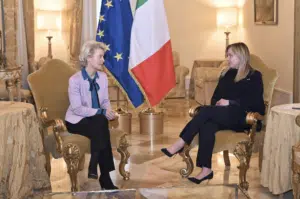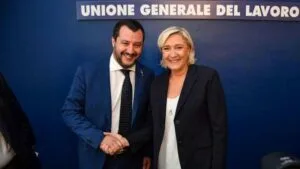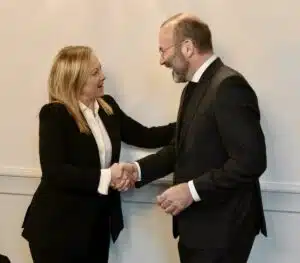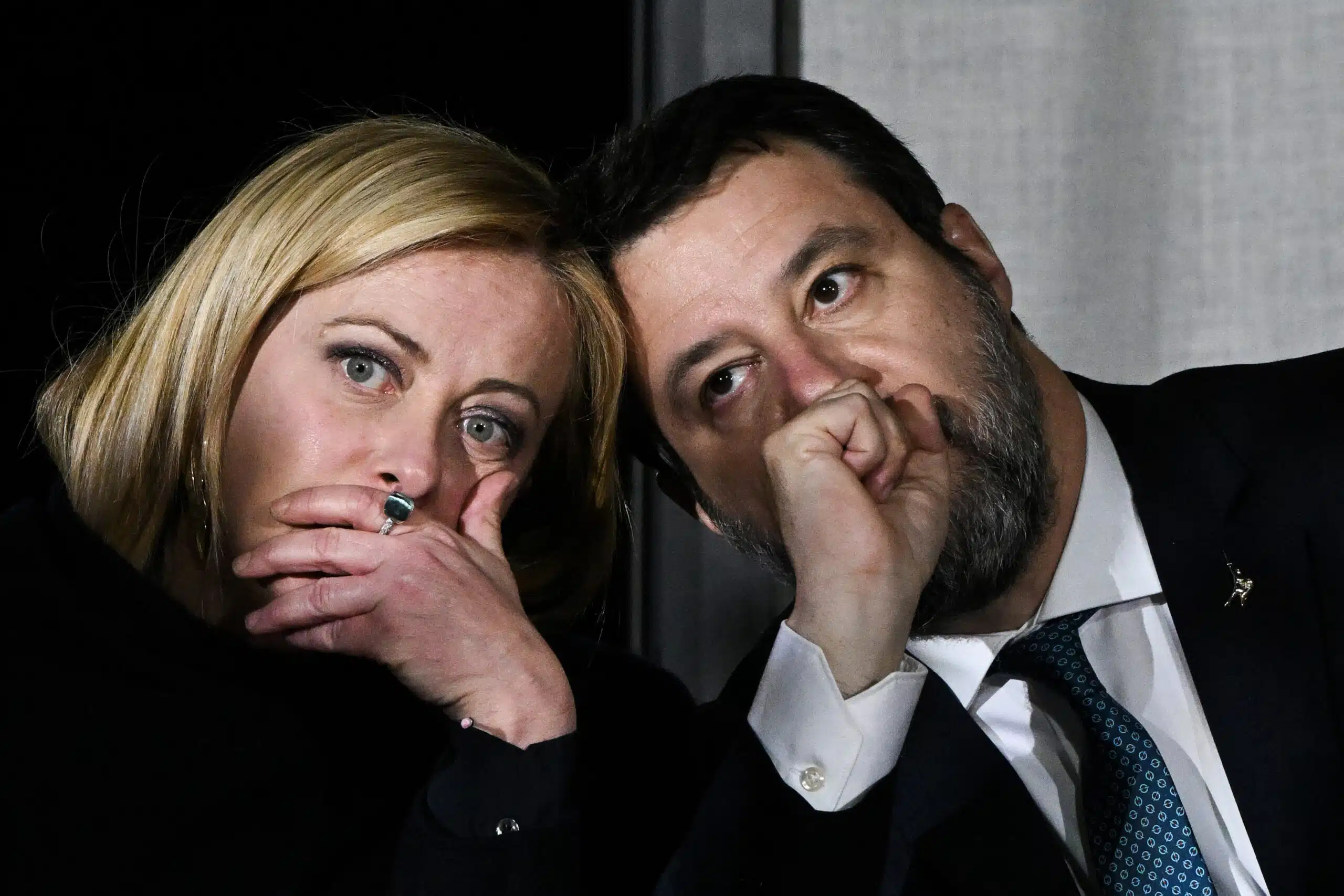Brussels -– The united centre-right may not be so united. “Personally, I would not vote for von der Leyen,” the federal secretary of Lega and Italian Deputy Prime Minister, Matteo Salvini, made it clear today (Jan. 31) making a point with the press at the European Parliament, potentially opening a big crack with the majority partners of Fratelli d’Italia and Forza Italia. A “no” to a new EU executive led by the current president Ursula von der Leyen that will create not a few problems for the governing coalition of the premier Giorgia Meloni, who has been engaged for months in a rapprochement strategy w the popular German president, who in the coming weeks could become theSpitzenkandidat of the European People’s Party (EPP) ahead of the next legislature.

Salvini harshly criticises von der Leyen and uses the tractor protests to send a political message: “Farmers who are in the streets all over Europe have problems with the current European Commission, the von der Leyen commission from this point of view is disastrous,” particularly “on the labour and rights front” and for “crazy pseudo-green policies.” It is a lunge that could become a headache for Meloni, not so much for a majority entry in the EU Parliament for the European Conservatives and Reformists (ECR)—the president of the European party herself excluded alliances with the Socialists in Brussels—but rather for the scenarios that may open up in the council. When choosing the next president of the EU Commission, the balance among the 27 EU governments will be decisive, and it is on this front that Meloni is trying to carve out a weighty role. Having the main majority ally at the national level against her could become an element of instability for the premier’s strategy.
Salvini’s political offensive, however, does not only concern the von der Leyen cabinet, but also the partners of the “united centre-right in Italy and Europe.” When asked whether problems might not arise within the ranks of the EPP regarding the presence within the Identity and Democracy group (of which the League is a member) of the German far-right Alternative für Deutschland, the Italian vice-premier sharply replies that “rather, we are the ones having problems with those who have mismanaged this Europe with the socialists for too many years and disrupted the production system,” although “I could overcome these obvious problems, as we look beyond.” That is, to the “historic occasion” when “for the first time there could be a majority without the socialists” in the European Parliament.

From left: League Secretary Matteo Salvini and former Rassemblement National President Marine Le Pen
Salvini looks with confidence at the growth in the polls of the Id group, which could experience an electoral surge thanks to the exploit of the Germans of AfD—polled today between 21 and 22 per cent—and the growth of the French Rassemblement National —around 28 per cent—despite the Lega’s vertical collapse (from 28 to 9). “We are today the third largest group in the European Parliament [only according to projections, ed.], we can grow with new delegations with which we are in contact,” said the vice-premier, hoping for the scenario whereby the far-right group will be “decisive”. No word, however, on the menaces of the former president of the French far-right Rassemblement National party, Marine Le Pen, of having to review the alliance with AfD within the same Id group for the plan for “remigration” discussed by the German ally.
European right-wing alliances between Salvini and Meloni
An agreement between the right-wingers in Europe—already sponsored by the president of the EPP, Manfred Weber—clashes with the complicated picture of national party affiliations, an element of instability in the three European parties ranging from the moderate to the extreme right. Special attention is on the European People’s Party (which includes 84 parties including Forza Italia, the Christian Democratic Union of Germany, the French Republicans, the Spanish People’s Party, and Poland’s Civic Platform), which may be trying to tighten relations with the European conservative family, even if extremist fringes are part of it.

The president of the European People’s Party (EPP), Manfred Weber, and the Italian Prime Minister and President of the European Conservatives and Reformists Party (ECR), Giorgia Meloni
It should not be forgotten that the 13 political formations belonging to the Conservative and Reformist Party are led by the same leader of Fratelli d’Italia, a party that at the national level positions itself in the extreme right (of post-fascist derivation). Also within it are other ultra-conservative parties, such as the Spaniards of Vox, the Swedish Democrats, the Slovaks of Freedom and Solidarity, and especially the Poles of Right and Justice (PiS). It is precisely on Poland that the table could be turned for a right-wing alliance, because at the head of Civic Platform is the former president of the EPP and former president of the European Council between 2014 and 2019, Donald Tusk, one of the strongest antagonists of an alliance in Brussels with the political family representing parties like PiS. Adding to this is the fact that in recent weeks rumors of a possible entry of Viktor Orbán‘s Hungarian Fidesz party have increased, sponsored even by the former Polish prime minister, Mateusz Morawiecki. “It is a decision of the whole group once a membership application is made, but at the moment it has not arrived,” the ECR group says.
 Considering the fact that a majority in Europe composed only of Populars and Conservatives is not feasible at the moment, Salvini’s proposed option is to replicate the Italian governing coalition: in Rome, there is a right-wing Forza Italia-Fratelli d’Italia-Lega majority, in Brussels one should aim for a very wide PPE-ECR-ID camp. The words of the Italian Foreign Minister and EPP Vice-President Antonio Tajani last summer and the even more explicit words of the president of the EU Parliament, Roberta Metsola—”When we go to the elections in June, we have to propose a pro-European choice to the citizens”—demonstrate that among the majority of the populars it is considered almost impossible this kind of scenario because the Party of Identity and Democracy is full of anti-European forces. In this sense, the Lega, which in Italy is not considered the most right-wing force on the parliamentary political chessboard (a title that belongs to Meloni’s party), sits in Brussels with the most ultra-nationalist parties on the entire European scene. Important sources within Identity and Democracy confirm, however, that there is a “constant dialogue” between Weber and Marco Zanni (president of ID) and that the possible convergence with Meloni could be understood as an attempt to secure “a strong figure in the council.”
Considering the fact that a majority in Europe composed only of Populars and Conservatives is not feasible at the moment, Salvini’s proposed option is to replicate the Italian governing coalition: in Rome, there is a right-wing Forza Italia-Fratelli d’Italia-Lega majority, in Brussels one should aim for a very wide PPE-ECR-ID camp. The words of the Italian Foreign Minister and EPP Vice-President Antonio Tajani last summer and the even more explicit words of the president of the EU Parliament, Roberta Metsola—”When we go to the elections in June, we have to propose a pro-European choice to the citizens”—demonstrate that among the majority of the populars it is considered almost impossible this kind of scenario because the Party of Identity and Democracy is full of anti-European forces. In this sense, the Lega, which in Italy is not considered the most right-wing force on the parliamentary political chessboard (a title that belongs to Meloni’s party), sits in Brussels with the most ultra-nationalist parties on the entire European scene. Important sources within Identity and Democracy confirm, however, that there is a “constant dialogue” between Weber and Marco Zanni (president of ID) and that the possible convergence with Meloni could be understood as an attempt to secure “a strong figure in the council.”






